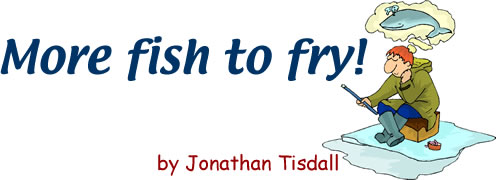
There is something oddly satisfying about being topical, even if you were told to be, and even if you weren't particularly enthusiastic about a subject. After last month's look at the sad state of the world's fish, which ended with an appeal to try some of the little-known delicacies hidden in a cod head, it seems that the matter has surged into public focus. Or maybe it is just because my reluctant conscience has now been trained to read sad and fishy tales? At any rate, I now have a surfeit, and have to clear my plate so that I can try to move on to something else.
Cheeky
Not all of the stories have been depressing. One of the first things I read after sending off my last report was a bizarre newspaper cookery item picking up where I left off. The Norwegian chef in question had whipped up a dessert based on cod cheeks, and the startled reviewer confessed to being pleasantly surprised. This bit of creativity involved reducing this rare and delicate ingredient to playing only a textural role.
The writer marvelled at the absence of fish taste in the final concoction - Cod on a straw spit in honey, with mango and vanilla ice cream - but I can't help finding this a kind of metaphor for wasting a natural resource. At the very least, it provides a strong reminder of why sensible, homebound cooking catapults TV chefs to enormous popularity. The rest of the feature article contained equally ostentatious recipes, but at least there the cheeks were allowed to be cheeks.
Cheering up
Fish provided plenty of good news on the family front, with Danish research indicating that eating our finned friends can prevent premature births - see the table of links below. This followed on the heels of UK research that fish oils, particularly the famed Omega-3, can reduce symptoms of hyperactivity and dyslexia in children. These remarkable findings need to be confirmed, but Norwegian experts were not surprised, since there has long been evidence to support the old homespun wisdom that fish is brain food, Omega-3 having links to brain development.
Sinking down
Now that there are even more health-based reasons to enjoy fish, the bad news returns, which tends to be the price paid for staying informed. The UK's Marine Conservation Society report takes a much needed step of trying to spread information on dwindling world stocks, and even offers a suggested plan of action. Unfortunately, this means exercising considerable restraint, in some cases to the point of actually ... noteating fish. A closer look at more grim findings from the ocean's depths can be found in this month's table of links.
This leaves a distinctly bitter taste in the mouth - ecological and political realities definitely put a damper on culinary considerations. As global influences finally start opening palates to dare to sample more and more of the sea's temptations, the ability to move global supplies quickly contributes to the depletion of both staples and delicacies.
Here in Norway there is more emphasis on the financial impact of overfishing, with a focus on coastal and northern regions withering and dying as huge commercial trawlers put modestly but sensibly run fisheries out of business. Quotas and dwindling stocks are a recurring worry, yes, but there is little sense of the grim warnings from the UK, and less sign of threat to the selection at the fishmongers.
A different approach
The official attitude leans in the opposite direction. The industry here currently strives to restore the traditional belief that one's dinner should come from the sea at least half the time, fighting the trend in a nation long dependent on fish but increasingly seduced by meat. A TV campaign to win back pride of place for fish is currently underway, with the public being plied with tempting recipes as often as possible.
Of course this is in some degree down to the differences in supply. We have an abundance of fine farmed salmon for a start. Access to cod from even further north helps a bit, and cod and halibut farming is being developed. In fact, Norway seems to spending a great deal of energy finding ... originalways to try and get people to eat fish.
One of the most startling made headlines recently when Norway's major dairy (yes, dairy) concern invested heavily in a curing technique designed to create ... fish salamis. This illustrates very well the kind of confused culinary relationship between Norwegians and fish at the moment.
So ... should we be trying to expand our horizons in the seafood department at the moment? Can we trust the cookery traditions of a country that is planning to flood the world with fish salamis and makes dessert from cod cheeks? Sure - a bit of common sense should help make an informed decision.
Will we modify our habits in order to respond to ecological dangers, and try to change things for the better by wielding consumer might? I hope so, though this won't be easy. We will need to find ways to motivate ourselves. I can't rule out a fish salami being a tasty treat, but I can't help thinking it will probably be worth some effort to ensure it isn't the only thing on the seafood menu.
Jonathan Tisdall is a Japanese-Irish-American freelance journalist who emigrated to London before settling in Norway. This has resulted in a wide range of influences, and he still occasionally forgets where he is.
© 2002 Jonathan Tisdall